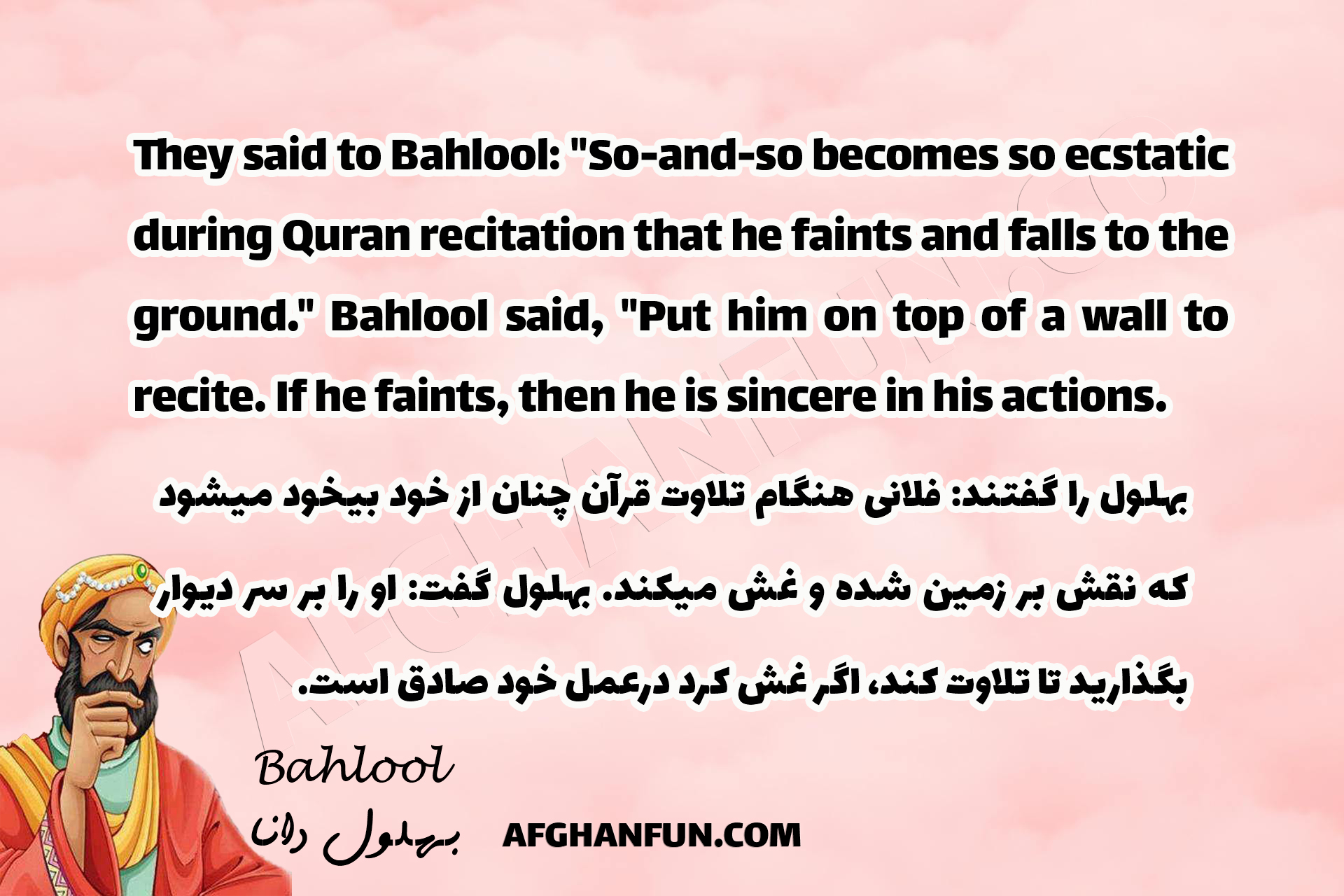Bahlool’s Wisdom on Sincerity in Quran Recitation
They said to Bahlool: “So-and-so becomes so ecstatic during Quran recitation that he faints and falls to the ground.” Bahlool said, “Put him on top of a wall to recite. If he faints, then he is sincere in his actions.
Bahlool Dana
The Anecdote Explained
بهلول را گفتند: فلانی هنگام تلاوت قرآن چنان از خود بیخود میشود که نقش بر زمین شده و غش میکند. بهلول گفت: او را بر سر دیوار بگذارید تا تلاوت کند، اگر غش کرد درعمل خود صادق است.
بهلول دانا
Insights into Spiritual Sincerity
Баҳлулро гуфтанд: фулонии ҳангоми таловати қуръони чунон аз худ бӣхуд мешавад ки нақш бар замин шудау беҳуш гардад. Баҳлул гуфт: Уро бар сари девори бигузоред то таловат кунад, агар беҳуш гардад дaр ъмaли худ содиқ аст.
Баҳлули доно
Insights into Spiritual Sincerity
قَالُوا لِبَهْلُولٍ: “إِنَّ فُلَانًا عِنْدَ تِلَاوَةِ الْقُرْآنِ يَبْلُغُ بِهِ الْحَالُ حَدَّ أَنْ يَسْقُطَ عَلَى الْأَرْضِ وَيُغْشَى عَلَيْهِ.” فَقَالَ بَهْلُولٌ: “ضَعُوهُ عَلَى رَأْسِ جِدَارٍ لِيَتْلُوَ الْقُرْآنَ، فَإِنْ أُغْمِيَ عَلَيْهِ، فَهُوَ صَادِقٌ فِي عَمَلِهِ.”
بهلول
This quote attributed to Bahlool reflects his deep insight into human nature, sincerity, and the performative aspects of spiritual experiences. Let’s break it down:
Context:
Bahlool was a well-known figure in Islamic mysticism (Sufism), often characterized by his witty and direct responses that conveyed profound spiritual lessons. He was known for using humor and paradoxes to convey truths that others might overlook.
The Quote:
- “They said to Bahlool: ‘So-and-so becomes so ecstatic during Quran recitation that he faints and falls to the ground.'”
This part suggests a person who is experiencing deep spiritual emotion, perhaps overacting or truly overwhelmed by the divine presence during Quranic recitation. It refers to an outward display of intense devotion or ecstasy, a common theme in spiritual communities. - Bahlool’s Response: “Put him on top of a wall to recite. If he faints, then he is sincere in his actions.”
Bahlool responds by testing the sincerity of the person’s devotion. His suggestion to put the person on a wall introduces a practical test: if the person faints while reciting from a dangerous height, it would imply that the person is so absorbed in their connection to the Quran that they would ignore the risk of falling. On the other hand, if they are aware of their surroundings and hesitate, it may suggest that their ecstasy is not truly from a place of deep spiritual absorption, but rather a performative or superficial reaction.
Key Insights:
- Sincerity vs. Performative Devotion:
Bahlool draws attention to the difference between genuine spiritual experience and the outward display of devotion. The suggestion to recite while on a wall, where one’s safety is at risk, is a clever way to test whether the person’s devotion is driven by a deep, internal connection to the divine or merely a show for others. True devotion, Bahlool implies, should transcend external circumstances and be unwavering, regardless of where one is. - Ecstasy and Ego:
The outward display of ecstasy during Quran recitation can sometimes be a form of self-expression or even ego. Some people might perform such acts to gain admiration or recognition, believing that their outward signs of devotion signify spiritual purity. Bahlool’s response is a critique of this: genuine connection to the divine does not require the approval or admiration of others. - Testing Spiritual States:
The wall metaphor is also a subtle reminder that spiritual states should be tested in real, potentially difficult circumstances. If someone’s devotion can only manifest in safe, comfortable settings, it might not be as pure as it seems. The true test of one’s spiritual depth might come in moments when external validation and comfort are absent.
Conclusion:
Bahlool’s response challenges superficial displays of spirituality and calls for a deeper, more sincere connection with the divine. By proposing a test that would challenge the person’s focus and commitment, he underscores the idea that true piety is not about dramatic expressions of devotion, but about internal sincerity and steadfastness, even in challenging situations.











